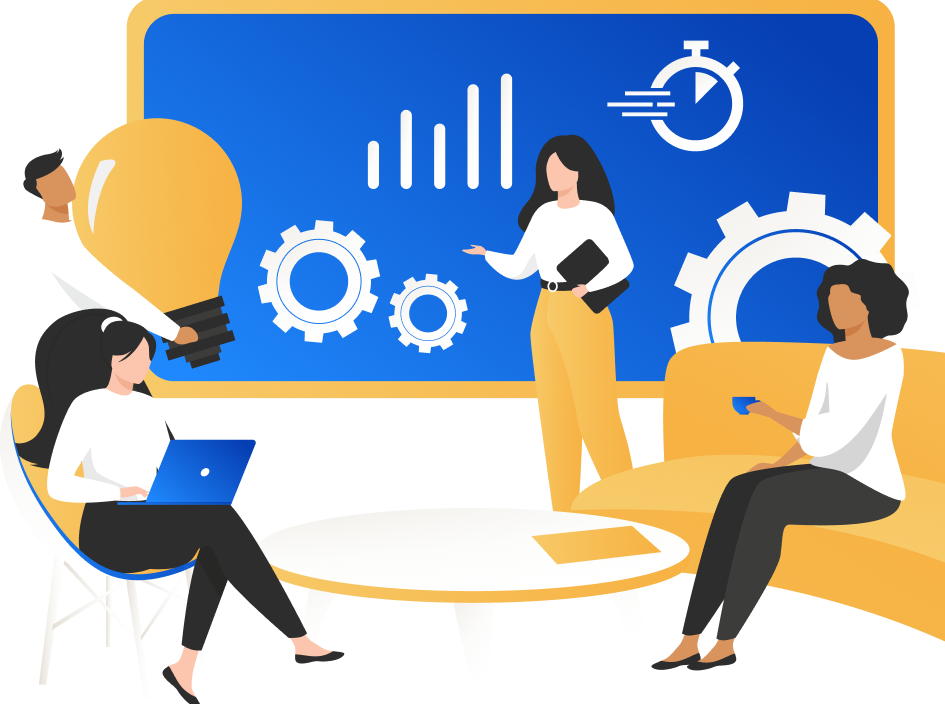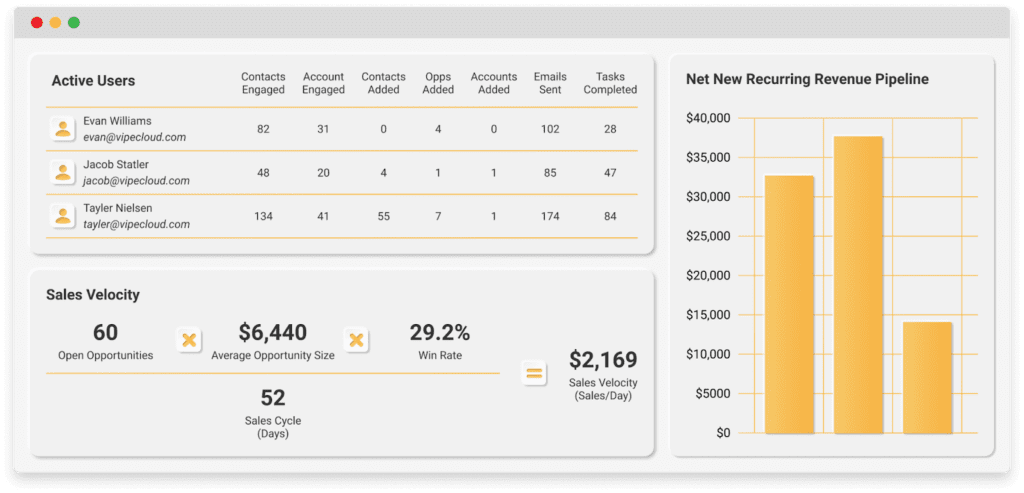Last updated on August 3rd, 2023

Is ERP or CRM right for your business? This post will help you compare where both systems shine so you can make an informed decision on which to implement.
Customer relationship management systems (CRMs) and Enterprise Resource Planning systems (ERPs) are extremely valuable business solutions.
But what do they do that sets them apart, especially from one another?
While they can make customer and sales data more accessible across different departments, their functions have very different focuses.
So knowing which system to start developing first is key to growth and productivity (especially for small businesses.)
Let’s analyze both CRM and ERP systems and how they complement different functions of your business.
You’ll learn:
- What Is ERP?
- What Is CRM?
- Is CRM Part Of ERP?
- What Is The Difference Between ERP And CRM?
- Should Small Businesses Use CRM Or ERP?

VipeCloud is the only Automation tool your small business needs to
be the hero to your customers.
With Email, Texting, Social, Suites, Chat, Stories, Video Email & Sign Up Forms fully built-in, we provide you with the perfect platform to grow your business.
15 Day Free Trial – Get started risk free. No CC needed.
What is ERP?
ERP stands for Enterprise Resource Planning, and it’s software that’s a conglomerate of multiple systems that manage and integrate all parts of a business.
This includes things like:
- Manufacturing
- Financial processing
- Customer-facing services
- Asset management
- Purchase orders
- Department collaborations
- Marketing channels
- Human resources
- Core supply chain
…And practically every other part of a business that works together to form the company itself.
Reports show that ERP can help lower operational costs (things that help run your business) by 23% and administrative expenses (ex. manufacturing, wages, utilities) by 22%.
If we look at big companies, these reductions in costs can have a domino effect of positive results on the company’s bottom line.
But before you invest in ERP, you should know about the cost.
According to Client First, ERP implementation has different cost ranges depending on company size:
- Small businesses: $10,000 – $150,000
- Mid-sized businesses: $150,000 – $700,000
- Large enterprises: $1 million – $10+ million
With ERP being the focal point of so many operations, implementation can take time, and thus the cost reflects that (the price of the software itself is just one slice of the implementation pie).
The article also mentions that other factors affect the cost, including the number of users in your company, your specific industry, and how many locations your company has.
Even the type of ERP system can change your final price point.
Here are 3 forms of ERP you’ll come across in today’s age:
- On-Premise ERP – Software used within the physical office and housed by computers and servers on the local network. Both the ownership and support of the software’s functionality are handled in-house.
- Cloud-Based ERP – Software with a more interactive approach between the software provider and the company. It uses a web-based solution to store data on any device that can connect to the internet.
- Hybrid ERP Software – This type of solution uses both aspects of on-premise and cloud-based ERP. It uses in-house software, cloud-based data, and support to integrate benefits that neither kind of ERP system has all by itself.
What Are The Benefits Of Using ERP?
Under an ERP system, all aspects of an enterprise are connected.
Software built for this purpose helps project managers plan and budget each process of a business, which ultimately helps to improve:
- A company’s financial health
- Profitability
- Internal communications
- Strategic business decision-making
For example, let’s say Company X plans to release a new product to their customer base.
With ERP, Company X can compute the cost of producing this new product and gather the critical parts (materials, technology, supply chain, etc.) that can help take the product from concept to reality.
And with the tracking capabilities of ERP, managers at Company X can forecast when the product will be complete and when it will be ready for mass-market.
So the big picture?
An ERP system’s job is to increase efficiency on an organizational level by improving how resources and tasks get handled.
The fewer resources that each department needs without sacrificing quality and performance, the more a business’s growth and profitability can improve.
But when choosing ERP software, it’s essential to think about how well it will integrate into your current business.
Why?
Because problems can arise where old working processes are incompatible with the new software or when there’s a reluctance to move from one program to a new one.
A successful ERP is ultimately an ERP that fits your current practices.
So, with all this said, let’s look at the other side of the ring:
What is CRM?
CRM stands for Customer Relationship Management. It’s software that manages all of a company’s relationships and touchpoints with current and potential customers.
The goal of a CRM?
It is to improve business relationships: connecting customers to the company while enhancing profitability and streamlining marketing processes.
In simple terms, it works through the whole lifecycle of a customer:
- First, introducing a product or brand
- Selling the product and promoting the brand mission
- Branching out to new customers to win even more business
- Helping to retain and increase the LTV of a customer
You also get a means of streamlining internal company processes like communication and project workflows.
After all, how a company internally uses CRM can reflect on the customer experience and overall revenue.
Sometimes companies heavily focus on using CRM outward (managing external interactions and relationships that drive sales) and forget the internal automation, task reminders, and reports that simplify running the business.
One of the cornerstone benefits of CRM is the amount of information you can store just on a single customer.
From sales professionals and customer service representatives to business developers, your staff can access the information as needed and adjust strategies accordingly.
In fact, 74% of users mentioned that CRM improved how they accessed customer data.

If we look at the old-fashioned way of things, sales teams would have direct information from customers.
Still, all too often, that critical information was lost or buried in various handwritten notes or computer files.
And this got even worse:
Since customers often interact with a company on various platforms (calling on phones, visiting the website, exchanging emails, social media), information and customer behavior indicators were all over the place.
Without a universal platform to manage all this information, it’s easy for business processes to get bogged down while customer concerns and issues are left unaddressed.
So this is what CRM helps fix.
What Are The Benefits Of CRM?

- A strong CRM system can improve your bottom-line processes by helping you gain more conversions, accurate sales follow-ups, and team productivity.
- The ease of sharing and storing customer data leads to faster decision-making and, as a result, greater customer satisfaction with services. You can make more informed marketing decisions based on CRM data, and sales can focus on the right customers more quickly.
- CRM costs (software and implementation) can be very low, bringing a great ROI, especially for small businesses. (Ex. Ranging from as low as $12 per user each month to $300 per user each month on the higher-end.)
- The security built into CRM systems also helps businesses become more trustworthy with customer data.
Is CRM Part Of ERP?
The short answer is yes.
Think of ERP as an umbrella term for a wide range of business systems, and one of those systems (inside of it) is CRM.
Here are some CRM related tools inside of ERP:
- A storehouse of customer metrics and data
- Sales data and reports
- Marketing automation
- Project management
- Business reports
- CPQ tools (configure price quote)
Now time for the longer answer.
Not all ERP systems are made equal. Some will be more focused on internal aspects of the business, while others will have a holistic combination of everything (including customer-focused technologies).
CRM software is no different.
Some have a heavily focused sales and customer service component, while others combine marketing, sales, and customer service in a roundabout way.
Let’s now dive into the exact differences you can expect from ERP and CRM.
What Is The Difference Between ERP And CRM?
ERP and CRM have a fair bit of overlap, especially in marketing automation, but at the end of the day, they still serve two different purposes:
While ERP focuses on optimizing each aspect of a business, CRM is focused on improving the customer experience.
ERP can still contain elements of CRM through the management of marketing, but most ERP-focused software won’t perform in the same areas as strongly as CRM.
Customer Relationship Management systems have tools that are tailor-made for maximizing customer interactions.
If you’re already content with the inner workings of your business and want to focus on improving sales, a CRM system may be all you need.
Especially — if you’re a small business — CRM will help you keep costs low while still providing an excellent experience for your customers and internal communications.
However, as you get farther down the road, you may find ERP systems that can help your company grow with more streamlined department, financial and supply-chain software.
(Because the needs of a 20-employee business that scales to 2,000 employees will drastically change.)
Many CRM systems are even built with ERP compatibility in mind so you can integrate both into your business.
At the end of the day?
Any business can benefit from both practices, but it’s crucial to know your overall goals when investing in a new system for your business.
Use the tools ERP offers to encourage advanced productivity within big departments in your company. And make full use of CRM to simplify tasks, develop new leads, and add more revenue.
While it may not be feasible to introduce both at once, planning for the growth of your business while looking at ways to better handle customers can put your company in the right place.
Should Small Businesses Use CRM Or ERP?
“Focus on simplicity…once you get there, you can move mountains” – Steve Jobs.
Most small businesses are looking to grow, and for this to happen, there has to be:
- Great product-market fit
- Solid marketing with strong, attention-grabbing offers
- A streamlined sales process that takes people from leads to customers
- A great product
- Outstanding customer service
- Reporting and tracking of business performance along with strong analysis of the numbers
- Profit margins that help the business reinvest their bottom-line for further growth
When we look at these giant pillars of business growth, many of them go hand-in-hand with CRM.
If a small business were to jump over to ERP too early, it could be costly, along with many technologies that the company doesn’t need just yet.
As the business grows its operations, integrating both ERP and CRM would be ideal.
But when you’re on a smaller scale, simplicity is key.
So the verdict?
Small businesses should elect for a flexible CRM that improves the internal processes of your business while maximizing how you interact and manage your customers at a price point that doesn’t throw off your capital.
And if you’re looking for the right CRM made for small businesses, VipeCloud’s Sales & Marketing Suite is what many business owners are turning to.
Get the power of multi-channel marketing tools, sales enablement systems, customer service capabilities, and the simplicity that will help your business expand.
You can try VipeCloud today for a free 15-days (no card needed!)
And if you’d like to see its use-cases in action, request a free demo today.
